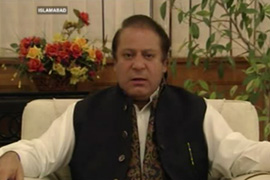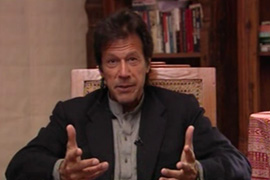Pakistan has endured a turbulent few months. Last November Pervez Musharraf, the Pakistani president, declared a state of emergency and suspended the constitution. Members of the judiciary were arrested and TV channels taken off air. The move was widely condemned and did little to enhance Musharraf’s democratic credentials.
Instability in the tribal area near the Afghan border has spread while militant Islam and suicide bombings are on the rise. Despite solid economic growth, very few of Pakistan’s 161 million people are any better off.
The return of Nawaz Sharif and Benazir Bhutto from exile last year offered hopes that political change was imminent. However, the assassination of former Prime Minister Bhutto last December brought home the stark reality of the challenges facing Pakistan.
Now, on Monday Pakistan will hold national and provincial elections, the outcome of which could have huge implications for the country’s future. In this Frost Over the World Pakistan election special, Sir David Frost talks to Imran Khan, Shaukat Aziz, Asif Ali Zardari and Nawaz Sharif. Sir David also talks to Maria Kuusisto, a political analyst from the Eurasia Group, for her take on the interviews and the forthcoming elections.
Asif Ali Zardari
 |
Asif Ali Zardari says election candidates are
being harassed |
Following the death of his wife, former Pakistani Prime Minister Benazir Bhutto, Asif Ali Zardari has effectively taken over the reigns of the Pakistani People’s Party (PPP).
Previously, Zardari had been seen as a political liability having spent several years in jail on corruption charges.
Zardari is from a little-known landowning family in southern Sindh province. After marrying into the Bhutto dynasty in 1987, his political influence grew.
After his release from prison in 2004, Zardari kept a low-profile. Bhutto’s assassination changed this – he has now pledged to continue her fight for democracy.
Zardari tells Sir David that he is not optimistic about the upcoming elections being free and fair and says that candidates are still being harassed. Zardari suggests that if the elections were transparent Musharraf would not stand a chance of winning.
He also indicates that his party would be willing to form a coalition government if it would help the political process in Pakistan.
Nawaz Sharif
 |
Nawaz Sharif says the polls are likely
to be rigged |
Nawaz Sharif represents the Pakistan Muslim League (N) and has been elected twice as prime minister of Pakistan. Sharif was ousted and then exiled in a military coup led by Musharraf in 1999.
Before his exile, Sharif was an extremely influential figure in Pakistani politics. He held large majorities in parliament and dominated the country’s political institutions, with the exception of the army. This ultimately proved his downfall in a country where the military has long exerted power.
Sharif tells Sir David that Monday’s polls are likely to be rigged because Musharraf lacks grass-root support and is desperate to cling on to power. Sharif is also scathing of Musharraf’s decision to suspend the constitution last year.
Despite this, Sharif says he would be willing to work with Musharraf, provided the judiciary and the constitution are fully restored.
Shaukat Aziz
 |
Shaukat Aziz says Musharraf is the right person
to unite the country’s different political forces |
Following the 1999 military coup, Musharraf appointed Shaukat Aziz as the new government’s finance minister. Aziz had previously been a private banker with little political experience. Despite this, he was credited with the successful reforms of his country’s economy.
In 2004 Aziz’ party, the Pakistan Muslim League (Q), named him prime minister. Aziz combined the roles of prime minister and finance minister up until November 2007.
Aziz tells Sir David that Musharraf is the right person to bring together the various political forces in the country. He also says that the elections will probably produce a coalition government, which would be in Pakistan’s national interest.
Imran Khan
 |
Imran Khan predicts huge unrest if Musharraf
wins the elections |
In a system that has been dominated by political and military families for decades, Khan is a relative minnow. In 1996, he founded the Pakistan Tehreek-e-Insaf (Movement for Justice). It is a small and marginal political party with Khan its sole elected member of parliament.
Khan is a vehement critic of Musharraf. Last October, Khan joined 85 MPs in resigning from parliament in protest over the presidential election. He was also held by the Pakistani police under anti-terrorism laws for attending a protest in a Lahore university after Musharraf had declared a state of emergency.
Speaking to Sir David, Khan warns that if Musharraf were to win the polls there could be huge unrest, worse than the recent violence in Kenya. He predicts that the PPP and PML-N should win a majority but warns that the elections might be rigged.
Frost Over The World airs at 18:00GMT every Friday on Al Jazeera English and is repeated during the week.





